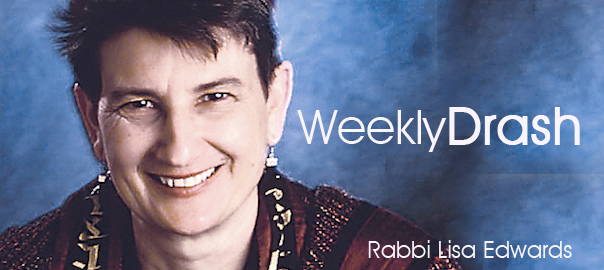Parshat Ki Tavo- August 23, 2013 : Antoinette Tuff – Ruach Chayim

By Rabbi Lisa Edwards
She’s a lot of people’s new hero — including mine — Antoinette Tuff — T-u-f-f — do you know the name? Several of you have written to me about her.
She’s the school bookkeeper who works in the front office at the primary school in Decatur, Georgia [the Ronald E. McNair Discovery Learning Academy just of outside Atlanta, Ga.] who “became a hero when she calmly and compassionately persuaded 20-year-old gunman Michael Brandon Hill to lay down his AK-47 style assault rifle.”
A lot of people are commenting that she is well named — — T-u-f-f — she had to be Tuff to do what she did. But I disagree — strong, yes, brave, indeed, and smart and intuitive, but wouldn’t “tender” be a better description than “tough”? “Gentle, kind…” but tough? you get my point.
On this sixth of the seven sabbaths of consolation leading up to Rosh Hashanah, we are consoled by real life, by a real person acting in the world.
It turns out that Antoinette Tuff did have some training in crisis intervention. Which should motivate all of us to do the same, and I think in the not distant future we will have some trainings here at BCC, and I hope you will consider joining me in them. It’s obvious on a daily basis that one never knows when such skills might prove useful, might be life-saving for ourselves and others. And even if we never “need them for a crisis moment,” it is easy to see that they might nonetheless improve our lives in all sorts of ways, including a deeper understanding of Judaism and its traditions.
Antoinette Tuff also had her faith and its teachings to guide her as well. (And there is a lot of overlap with ours.) Leviticus 19:16 for one: “Do not stand idly by the blood of your neighbor,” interpreted as it often is as preventing bloodshed as well as acting to help someone wounded. In the case of Antoinette Tuff she did both — she prevented bloodshed even as she helped the “wounded” and hurting young man who threatened her and her school community.
I am certain Tuff had no difficulty imagining what might transpire when Michael Brandon Hill entered the office with an AK-47 assault weapon, which he fired into the floor a few times. Slowly, she encouraged the young man to lay down his weapon.
911 tapes reveal that Ms. Tuff opened up to Mr. Hill about her life story, offered reassurance, and even told him at one point that she loved him. “You shall love your neighbor as yourself,” say the Torah verses that some claim is God’s most precious – and difficult – commandment.
“She did all the things we try to teach negotiators,” said Clint van Zandt, former FBI profiler and hostage negotiator, in an interview on NewsNation Thursday. “She was a great ‘go-between,’ she identified with the aggressor, she offered help, she minimized what he had done, she helped develop a surrender ritual, she told him what to expect, and told the police what to expect, she offered love, said she was proud of him, she offered him a positive future–every one of those things is something we spend weeks teaching negotiators…”
Antoinette Tuff is a hero, no doubt about it. We can all hope and pray that poor Mr. Hill gets the help he needs. Many commentators are noting what is needed next. For example, Columnist Petula Dvorak, writing in a Washington Post blog today [Aug. 23, 2013] pointed out that :
“…the gunman gave Tuff a pretty clear list of what drove him to that school with that weapon and that plan.
“Call the news,” he told her. He wanted attention.
He said he was off his medication and “just wants to go to the hospital.” He wanted better health care.
He told her that he “wants to go on the intercom and let everybody know he’s sorry.” He wanted someone to hear him and to forgive him.
He [also] wanted her to know it was easy to get an assault rifle when you’re on probation and mentally ill. He just took it from a friend.[1]
Dvorak didn’t need to say in so many words that Hill’s list is an important list for us as a society and our governments as well. How sad it will be if down the line the system should fail in repairing and preventing further damage or injury.
This week’s Torah portion, Ki Tavo, presents a challenging section. In it Moses, closing in on the end of his time with the Israelites, and the end of his life, instructs them to perform an odd sounding ritual when they arrive soon in the Promised Land. There are two mountains near each other in the Promised Land, with a valley between them. When you get there, says Moses, half the tribes should go up Mt. Gerizim and the other half up Mount Ebal.
Unlike some place names in Torah, we know where these mountains are and to this day they stand in stark contrast to one another — Gerizim is covered in green and Ebal is steep, barren, desolate.[2] From the green and verdant Gerizim we are to hear what will happen if we listen to the divine commandments: blessings will overtake us [28:2f], but from the barren hillside of Ebal, we hear what will happen if we do not listen to God’s voice: a longer list of curses will overtake us [28:15f].
It’s a strange passage for many reasons, among them that in general, Jews don’t incline toward a hellfire and brimstone kind of preaching. We don’t like to scare ourselves into “right behavior.” And in fact, Jewish tradition tries to ameliorate the scary list of curses by reading them in a whisper when we read from Torah (and tradition calls on adults, not our b’nai mitzvah kids to read them).
But the “curses” are worth looking at, especially because many seem to describe things that many people experience at some point or other in their lives, if not continually. Each year when I read the curses, one in particular stands out to me because, while it sounds less violent than some of them, it feels to me among the most torturous, and it comes almost at the end:
[WHISPER] God will give you an anguished heart and eyes that pine and a despondent spirit. The life you face shall be precarious; you shall be in terror, night and day, with no assurance of survival. In the morning you shall say, “if only it were evening!” and in the evening you shall say, “if only it were morning!” — because of what your heart shall dread and your eyes shall see.” [Deut. 28:65-67]
IT is such a graphic description of soul-searing depression. [WHISPER]: In the morning you shall say, “if only it were evening!” and in the evening you shall say, “if only it were morning!”
How frightening to be perpetually wishing you were not in the moment, not here now.
This year when I read that passage, I couldn’t help but think of Michael Brandon Hill saying to Antoinette Tuff that he hadn’t taken his medication the night before. In fact, I thought of him through all the curses — even if they are offered at the same time as the blessings, what if you are a person who hears curses more easily than blessings? who counts and measures — keeps score?
In this Torah portion the curses far outnumber the blessings. But that imbalance is mediated by one verse in particular: the curses descend not simply because we “disobey,” but “because you would not serve the Eternal your God in joy and gladness over the abundance of everything . . .” (Deuteronomy 28:47).
My friend and colleague, Rabbi Nancy Wiener, says that this verse “challenges us to see the links between our attitudes and behaviors, and repercussions for ourselves and others.”[3]
Any of us could keep score, and surely we all know people — maybe we are people — who have received more than their fair share of sorrow or illness or curses. Not every one of them chooses to make it a competition though.
We can well imagine what might have happened in that school office if Antoinette Tuff had responded differently. If she hadn’t sympathized, if she hadn’t been someone who understood – who had experienced – that curses come to all of us; if she hadn’t been someone who also believed in her heart and soul that good and bad come to all of us, and that it is up to us to strike a balance, to choose to see the blessings even when the curses threaten to overwhelm; if she hadn’t been someone who can see the humanity in every person, and the divinity in every person, even someone standing in front of her with a loaded rifle.
And miraculously, Ms. Tuff was able to give Mr. Hill a huge gift — the opportunity to see, however briefly, what she saw, an opportunity to choose life, to give life to others.
In this season of self-reflection, of turning and re-turning to our own souls, our own selves, in this season as we accept Judaism’s invitation to become more and more the person we want to be, the person God wants us to be, let’s learn all the lessons Antoinette Tuff offers us.
Rabbi Wiener reminds us of a special psalm we recite as the High Holy Days approach. Its message can serve as a frame for us as we review our lives and contemplate our lives for the year to come.
And this week, its message comes to us filtered through the person of Antoinette Tuff, a person we might all aspire to be more like. May these words from Psalm 34 soon apply to each of us:
Who is the person who delights in life?
One who loves each day and sees the good.
Keep your tongue from evil
and your lips from speaking deceitfully.
Turn from evil and do good
seek peace and pursue it. (Psalm 34:13-15)
Mi ha-ish hechafeitz chayim,
oheiv yamim lir’ot tov?
N’tzor l’shoncha meira
us’fatecha midabeir mirma;
sur meira va’asei tov
bakeish shalom v’rodfeihu
מִי-הָאִישׁ, הֶחָפֵץ חַיִּים;
אֹהֵב יָמִים, לִרְאוֹת טוֹב.
נְצֹר לְשׁוֹנְךָ מֵרָע;
וּשְׂפָתֶיךָ, מִדַּבֵּר מִרְמָה.
סוּר מֵרָע, וַעֲשֵׂה-טוֹב;
בַּקֵּשׁ שָׁלוֹם וְרָדְפֵהוּ.
[1] http://www.washingtonpost.com/local/antoinette-tuffs-911-call-on-ga-shooting-suspect-is-a-portrait-of-poise-compassion/2013/08/22/c62a6fa2-0b3a-11e3-8974-f97ab3b3c677_story.html
[2] Mount Ebal and Mount Gerizim provided a dramatic contrast. Both located in the mountain range of the tribe of Ephraim, they are very different places. A guide book from 1852 noted, “The contrast in their appearance can still be clearly seen. Mount Gerizim, located to the south in the valley of Shechem is verdant with gardens covering the terraces on its slope. Mount Eival (Ebal), on the north side, is steep, barren, and desolate.”1
1 Joseph Schwartz, Das Helige Land, (Frankfurt: Kauffmann Publisher, 1852), as quoted in Samson Raphael Hirsch, The Hirsch Chumash: The Five Books of the Torah, SeferDevorim (New York: Feldheim Publishers, 2009), p. 234
[3] http://www.reformjudaism.org/learning/torah-study/ki-tavo/delight-life?utm_source=WU&utm_medium=email&utm_content=20130823&utm_campaign=WeeklyParsha





